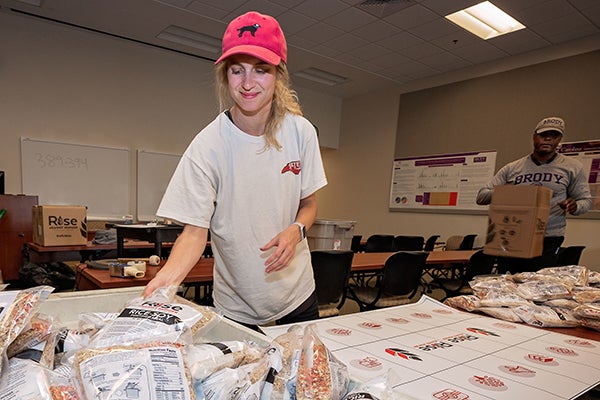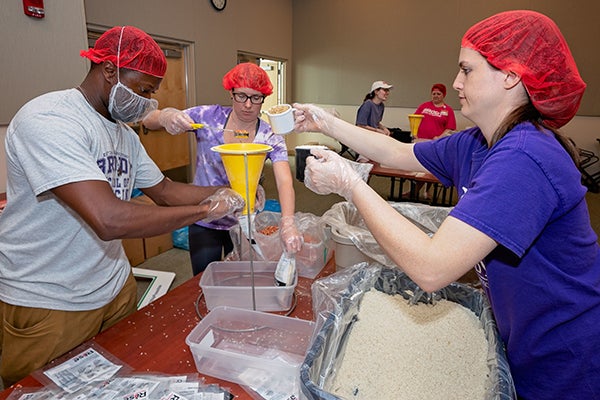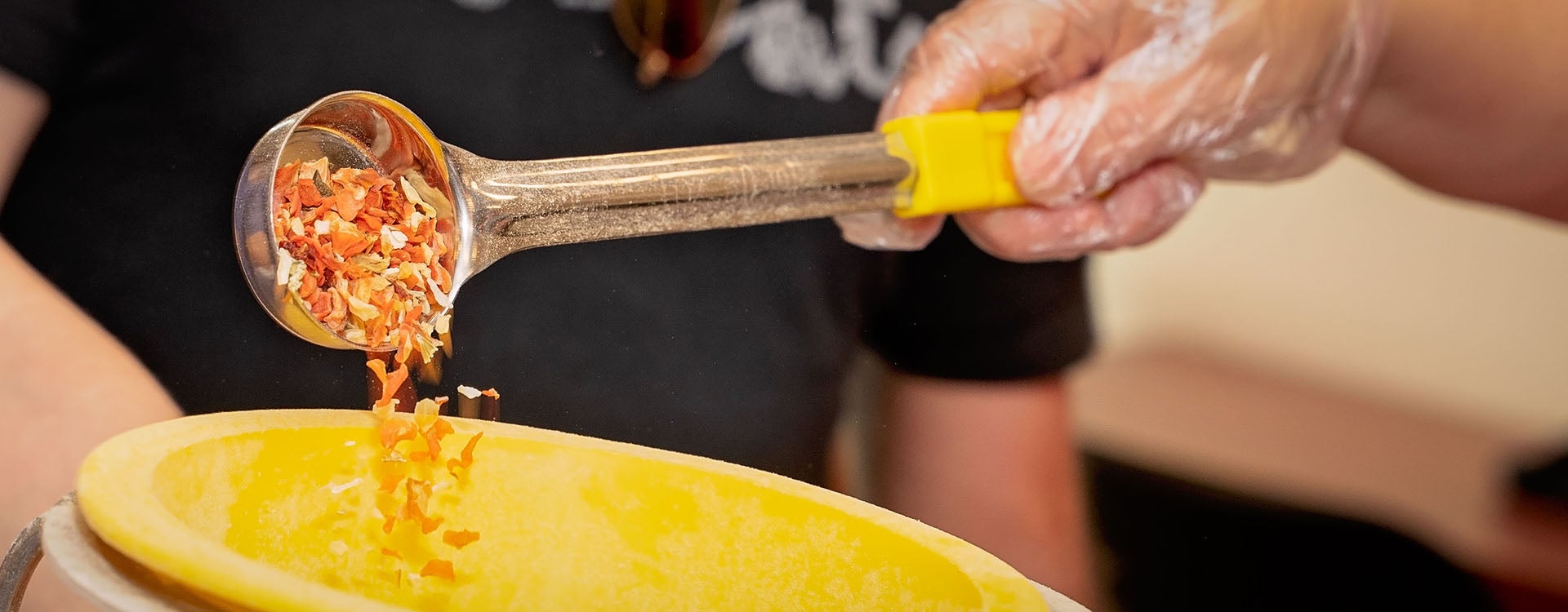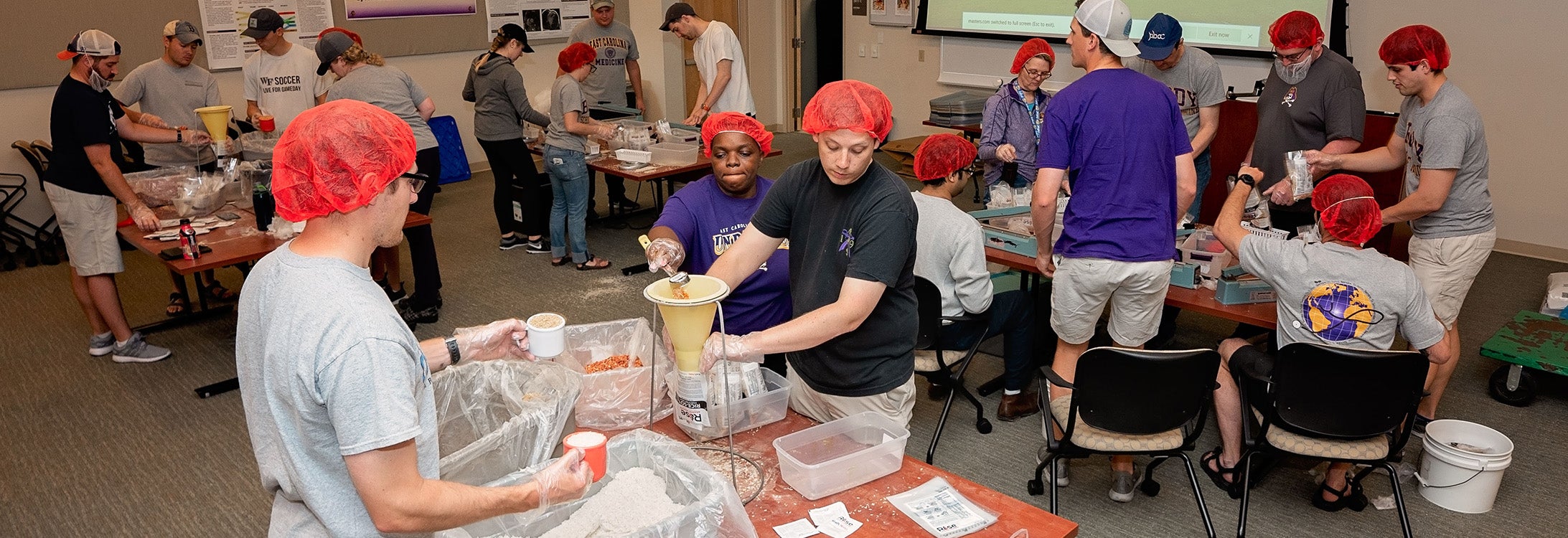COMBATTING FOOD INSECURITY
Brody medical students partner with service organizations to address hunger
Throughout their time at ECU’s Brody School of Medicine, medical students work with a variety of organizations to serve the community.

Aubrey Allen organizes food bags before E. J. Collins places them in boxes.
Before they graduate and head to residency programs across the country, the Brody Class of 2019 continued this tradition of service by partnering with the Food Bank of Central and Eastern North Carolina and Rise Against Hunger to combat hunger and food insecurity locally and globally.
On April 12, students worked in groups to package 20,000 meals that will be distributed around the world and sorted food donations at the regional food bank. This day of service culminated in a comprehensive learning session for students that addressed patient hunger and food insecurity, defined as limited or uncertain access to nutritious food options.
“There is a lot of need and health disparity here [in eastern North Carolina],” said Jessica Lee, a fourth-year student who will complete her residency in family medicine at Vidant Health. “A lot of people do have a problem getting access to food and I hadn’t seen that before coming here, and that’s the main reason I wanted to stay here to do my residency. I see how much I’m needed.”
According to the United States Department of Agriculture, the average rate of food insecurity nationally is 12.3%. In eastern North Carolina, the percentage of food insecure households is much higher, ranging from 20-29%.
The packaged meals will be labeled and tracked through Rise Against Hunger, an international nonprofit agency that distributes meals to impoverished communities around the world–often in Central and South America. Tracking labels will allow the agency and students to see the global impact of the food they helped distribute.
“Community service is integrated into our curriculum and into who we are throughout our entire time at Brody,” said fourth-year student Adrian Ambrose, whose residency will be in OBGYN at Orlando Health in Florida. “You can look at the smiles on everyone’s faces in here today and see how everybody’s enjoying themselves. It’s who we are, and we love giving back. It’s the best possible way to do a day of service; with the people we came in with.”
Dr. Susan Keen, director of Brody’s Service-Learning Distinction Track, advised the students throughout the food insecurity project.
“Over the past year, many students worked to establish the Medical Food Pantry at Vidant Medical Center to help patients who are being discharged from the hospital and don’t have enough healthy food to eat at home,” Keen said. “To build on this, for the first time, we are working with our graduating class in a large-scale event to learn more about food insecurity and take steps to combat it. We hope that when they begin seeing patients in their new communities in July, they will be aware of hunger and food insecurity and be able to identify local resources to help patients.”

From left to right, Adrian Ambrose, Jamie Hunter and Natalie Ford pour soy, rice and dried vegetables into a bag.
At the food bank, students sorted donated food that will be used by 800 regional food pantries across the region.
Students said the event provided perspective on what it will mean to be a physician and to see their patients as people first.
“One thing they definitely teach us here at Brody is to first really get to know your patients,” said Nelly Bellamy, a fourth-year student who will complete residency training in internal medicine at St. Louis University. “When you go in the room, sit down and take the time to get to know them. Asking them about where they came from, where they live and what do they do for work gives you an idea about their background and socioeconomic status and if they are able to afford food.”
Keen stressed the importance of physicians understanding patients’ access to healthy food, or lack thereof. Food insecurity can contribute to many health problems, including anemia, poor growth in children, high blood pressure and difficulty controlling diabetes.
“You can’t try to talk to someone about managing diabetes and paying for medications when they can’t afford to feed their family,” said fourth-year student Anna Laughman, whose residency will be in internal medicine-pediatrics at Vidant. “I think that is the root of getting to know patients beyond just their lab work. I think it’s great for students, before we become physicians, to be humbled again to be able to provide food—a basic human right and need—before we start with our long white coats and shiny stethoscopes in a position of authority and power in health care.”

Dried vegetables are measured and poured into a funnel to be bagged.
